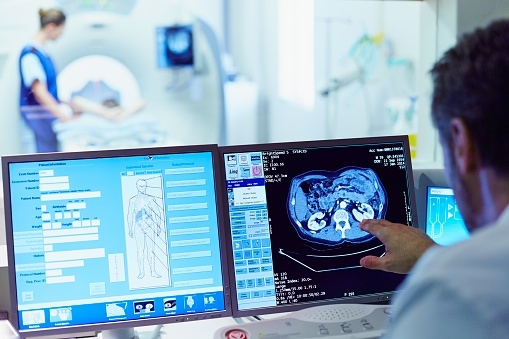While medical imaging equipment may not be such an obvious candidate for UPS power protection as, say, an operating theatre, it does, in fact, have a critical need for protection against power loss. This post looks at why this is so and suggests some suitable UPS solutions.
Technology is rapidly transforming healthcare and playing an ever-increasingly important role in the clinical diagnosis, treatment and monitoring of many conditions. This means that technology is not only helping to save lives, but it is also speeding up the recovery for millions of patients.
At the end of 2019, the UK Government announced a new hospital building programme. The programme aims to ensure the NHS’s hospital estate supports the provision of world-class healthcare services for patients. It sets out a long-term programme of investment in healthcare infrastructure including capital to invest in new diagnostics and technology to drive earlier diagnosis and improved survival rates.
UPS for X-ray and ultrasound machines
Thanks to recent advancements in electronics, imaging technologies such as X-Ray, MRI and ultrasound are becoming even more accurate, compact and affordable. This means that the general public has better access to these facilities which provide a more robust offering of diagnostic technologies resulting in quicker diagnosis. As a result, sophisticated imaging equipment has become a critical tool for medical professionals, who need around the clock access and operation. IT and facilities managers must be ready to meet these requirements.
It’s very easy to see how the loss of electrical power to an operating theatre could pose a risk to the safety of a patient but with medical imaging equipment, the power loss may not be so apparent. However, we must consider the impact on delays to diagnosis or treatment due to issued and downtime of vital imaging equipment. Furthermore, before a medical imaging scan, a patient may have to be injected with a radionuclide, radioactive or other tracers. If during the scan there is a power loss, then these tracers cannot be re-injected for a long time. This delays diagnosis and causes problems for the patient’s welfare.
Technological advancements have left healthcare facilities more dependent than ever on electronic systems to improve the quality of their service and operate safely, and an emphasis is now routinely being placed on supporting these systems with proper power availability. Not surprisingly, demand for power has grown significantly in the health sector and the rules governing its use have also become more comprehensive.
UPS for medical equipment
To conclude, with higher demand quality healthcare rising and regulation simultaneously increasing, what should providers do to ensure a successful future? They should start by taking a closer look at how they can implement a power management strategy to back-up imaging equipment and reduce the risk to patients of potential downtime. They also need to assess the specific needs of their facility to find appropriate power protection solutions including a suitable uninterruptible power supply. A medical UPS system will not only provide a level of protection for the patient, but they are also designed to protect the medical equipment itself from costly damage caused by unexpected power disruption and brownouts.
Due to the dynamic load characteristics and voltage regulation requirements of most medical imaging equipment, the sizing of a UPS can be difficult and the reason many healthcare authorities seek trusted UK UPS partners with the suitable experience in this field, such as KOHLER Uninterruptible Power.
For more information regarding any of our uninterruptible power supply products or UPS services, you can get in touch with KOHLER Uninterruptible Power via our contact page or call us on 0800 731 3269.





